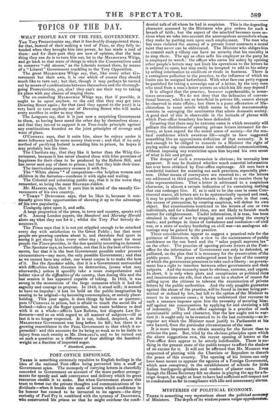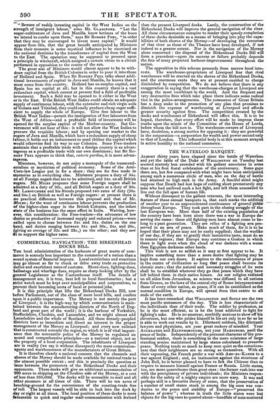MYSTERIES OF POLITICAL ECONOMY.
THERE is something very mysterious about the political economy of Ministers. The depth of its wisdom passes vulgar apprebennos.
—" Beware of rashly investing capital in the West Indies on the strength of immigrant labour," cries Mr. GLADSTONE. "Let the sugar-cultivators of Java and Manilla know betimes of the boon we intend to confer upon them," says Sir ROBERT PEEL, "m order that they may be encouraged to invest more capital." It would appear from this, that the great benefit anticipated by Ministers from their measure is some mystical influence to be exercised on the national destinies by the transference of capital from the West to the East. The operation may be supposed to proceed upon a principle in witchcraft, which assigned a certain virtue to a circuit performed in opposition to the course of the sun. The great aim of Ministers would almost appear to be to with- draw capital from the British Colonies in order to pour it into those of Holland and Spain. When Sir ROBERT PEEL talks about addi- tional investments of capital in Java and Manilla, he knows that it must come from this country. Holland has no surplus capital, and Spain has no capital at all ; but in this country there is a vast redundant capital, which cannot at present find a field of profitable investment. Such a field may be opened to it either in the West or in the East. If the British West Indies could obtain an adequate supply of continuous labour, with the extensive and rich virgin soils of Guiana and Trinidad, they could easily produce cheap sugar suffi- cient to supply the whole of Europe. Give free labour to the British West Indies—permit the immigration of free labourers from the West of Africa—and a profitable field of investment will be opened for the surplus capital of the Mother-country. But Go- vernment will not bear of this : it will not allow the West Indies to procure the requisite labour; and by opening our market to the sugars of Java and Manilla, which have a redundant supply of cheap labour, it holds out an inducement to send thither the capital which would otherwise find its way to our Colonies. Some Free-traders maintain that a profitable trade with a foreign country is as advan- tageous as a profitable trade with our own dominions ; but Sir Ro- BERT PEEL appears to think that, cateris paribus, it is more advan- tageous.
Ministers, however, do not enjoy a monopoly of the transcend- entalism or mysticism of political economy. Some of the Anti- Corn-law League put in for a share : they are for free trade in mysteries as in everything else. Ministers propose a duty of 34s. on all Foreign sugars that are to be admitted, and 24s. on all British sugars. Mr. MILES proposes that some Foreign sugars shall be admitted at a duty of 30s., and all British sugars at a duty of 20s. Mr. LABOECHERE and his friends proposed two rates of duty (20s. and 24s.) on British as well as Foreign sugars: at present there is no practical difference between this proposal and that of Mr. dKruss ; for the want of continuous labour prevents the production of the higher-class sugar in the British Colonies, and the infant state of the business has the same effect in India. Waiving, how- ever, this consideration : the Free-traders—the advocates of low duties as productive of increased supply and reduced prices—were called upon to choose between 34s. and 24s. duties on the one band, and duties ranging between 34s. and 30s., 24s. and 20s., (giving an average of 32s. and 223.,) on the other ; and they saw tt to support the higher rates.



























 Previous page
Previous page